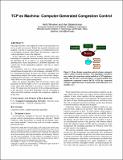| dc.contributor.author | Winstein, Keith J. | |
| dc.contributor.author | Balakrishnan, Hari | |
| dc.date.accessioned | 2021-09-08T15:19:11Z | |
| dc.date.available | 2013-08-12T20:46:48Z | |
| dc.date.available | 2021-09-08T15:19:11Z | |
| dc.date.issued | 2013-08 | |
| dc.identifier.uri | https://hdl.handle.net/1721.1/79837.2 | |
| dc.description.abstract | This paper describes a new approach to end-to-end congestion control on a multi-user network. Rather than manually formulate each endpoint’s reaction to congestion signals, as in traditional protocols,
we developed a program called Remy that generates congestion control algorithms to run at the endpoints.
In this approach, the protocol designer specifies their prior knowledge or assumptions about the network and an objective that the algorithm will try to achieve, e.g., high throughput and low queueing delay. Remy then produces a distributed algorithm—the control rules for the independent endpoints—that tries to achieve this objective. In simulations with ns-2, Remy-generated algorithms outperformed human-designed end-to-end techniques, including TCP Cubic, Compound, and Vegas. In many cases, Remy’s algorithms also outperformed methods that require intrusive in-network changes, including XCP and Cubic-over-sfqCoDel (stochastic fair queueing with CoDel for active queue management). Remy can generate algorithms both for networks where some parameters are known tightly a priori, e.g. datacenters, and for networks where prior knowledge is less precise, such as cellular networks.
We characterize the sensitivity of the resulting performance to the specificity of the prior knowledge, and the consequences when real-world conditions contradict the assumptions supplied at design-time. | en_US |
| dc.description.sponsorship | NSF (Grant CNS-1040072) | en_US |
| dc.language.iso | en_US | |
| dc.publisher | Association for Computing Machinery (ACM) | en_US |
| dc.relation.isversionof | http://conferences.sigcomm.org/sigcomm/2013/program.php | en_US |
| dc.rights | Creative Commons Attribution-Noncommercial-Share Alike 3.0 | en_US |
| dc.rights.uri | http://creativecommons.org/licenses/by-nc-sa/3.0/ | en_US |
| dc.source | Keith Winstein | en_US |
| dc.title | TCP ex Machina: Computer-Generated Congestion Control | en_US |
| dc.type | Article | en_US |
| dc.identifier.citation | Winstein, Keith and Hari Balakrishnan. "TCP ex Machina: Computer-Generated Congestion Control." Proceedings of ACM SIGCOMM 2013, August 2013, Hong Kong, China, Association for Computing Machinery, August 2013. | en_US |
| dc.contributor.department | Massachusetts Institute of Technology. Computer Science and Artificial Intelligence Laboratory | en_US |
| dc.contributor.mitauthor | Winstein, Keith | en_US |
| dc.contributor.mitauthor | Balakrishnan, Hari | en_US |
| dc.relation.journal | Proceedings of ACM SIGCOMM 2013 | en_US |
| dc.eprint.version | Author's final manuscript | en_US |
| dc.type.uri | http://purl.org/eprint/type/ConferencePaper | en_US |
| eprint.status | http://purl.org/eprint/status/NonPeerReviewed | en_US |
| dspace.mitauthor.error | true | |
| mit.license | OPEN_ACCESS_POLICY | en_US |
| mit.metadata.status | Complete | en_US |
